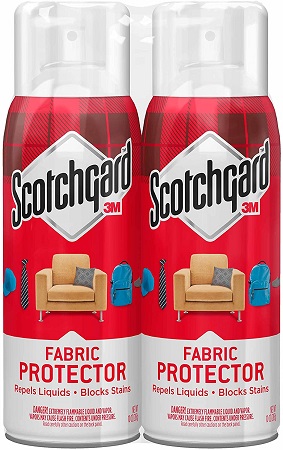- March 15, 2024
7 Best Couch Materials & Fabrics for Dogs (With Pictures) – Dogster
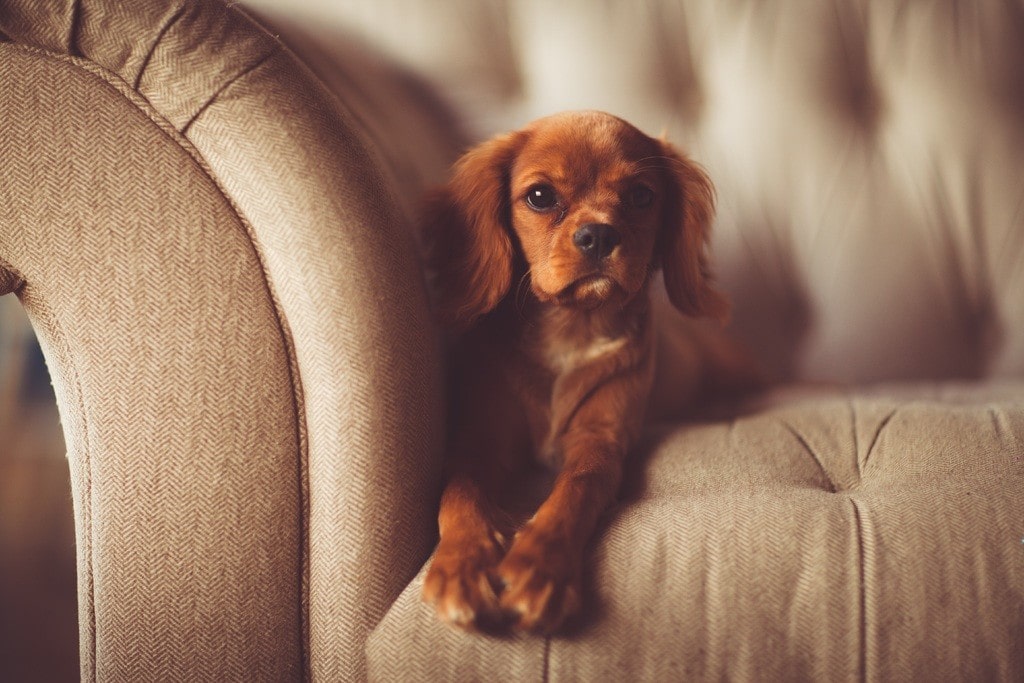
Owning a dog can be an absolute blessing for you and your family. However, those sentiments might not be shared by your furniture.
Dogs are notorious for ruining furniture—whether it’s intentional or not. But that doesn’t mean your pup has to stay outside. But you might want to consider investing in some furniture made out of a dog-friendly fabric.
Not all furniture fabric can hold up to the rigors of owning a pet, but there are plenty of great options available. But before we get into them, let’s take a look at some of the ways your pooch might tear up your couch.
The 7 Best Couch Materials and Fabrics for Dogs
1. Real Leather
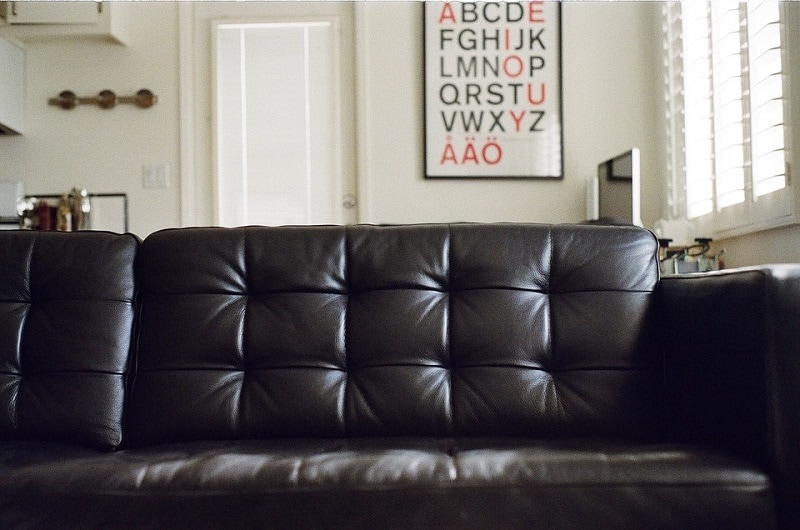
Take a poll of veteran pet owners and ask them, “What’s the best furniture material to have when owning a dog?” Genuine leather will more than likely be the number one answer. And there’s no surprise there. Leather is an excellent choice for several reasons.
First, it’s durable. No matter how hard you might try, there are going to be times where your pup is going to jump up onto the couch. With other materials, a sharp claw might puncture straight through. However, you won’t have that problem with leather.
Next, their claws aren’t going to get caught in the material and cause rips. That’s because leather is a solid piece of material. There are no gaps in the weave for their nails to get caught in. And if they do leave any scratches on the couch, those will help to distress the leather and give it that worn-in feel—one that many people often pay top dollar for.
Leather is also super easy to clean. It’s not like you need to take it to the dry cleaner. Simply wipe it clean with a damp cloth, and you’re ready to go.
The biggest downside to leather is the price. Often, leather furniture comes with a hefty price tag. But consider it an investment. It’s extremely pet-friendly, and you won’t have to replace your couch nearly as quickly. In fact, your leather furniture may serve you well for decades to come.
Pros
- Very sturdy
- Solid piece of fabric
- Easy to clean
- Scratches can actually make it more attractive
- Lasts a very long time
Cons
- Expensive
- Can get very hot in warmer months
2. Outdoor Acrylic Fabrics
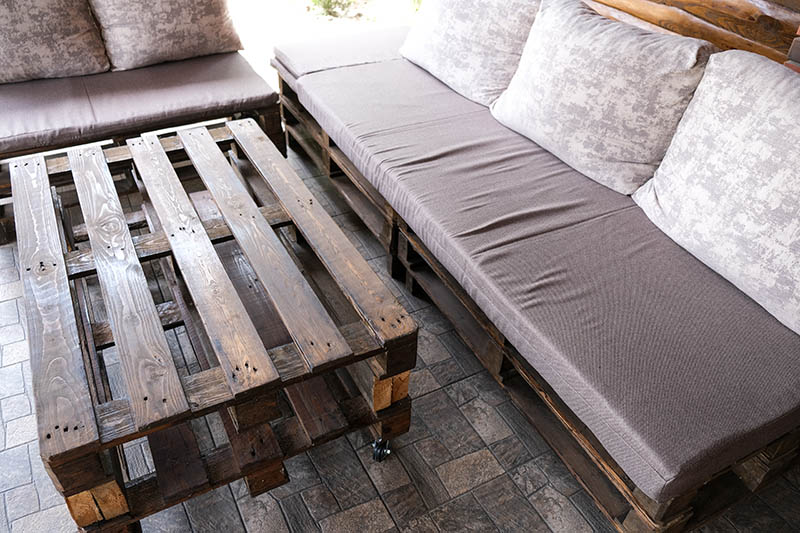
If you’re shopping for furniture to use indoors with a pet, you may want to consider outdoor seating. Furniture designed for outdoor purposes can hold up to heavy rain, sleet, snow, and everything else the elements can throw at you. So, it’ll be good enough for your pooch.
And don’t be worried about style and selection. There are tons of awesome options that’ll have you convinced that outdoor furniture isn’t just for your patio or sundeck anymore. This Polaris Garden Set will look incredible indoor or outdoors. And it’s made of durable rattan that your pup can climb all over without fear of damaging it.
You can also typically find outdoor furniture at a much cheaper cost than its indoor counterpart. So, if you’re looking to stretch your budget when purchasing new furniture, you might want to explore the “ins” of outdoor furniture.
There’s one thing you should be selective about when shopping for outdoor furniture, and that’s the cushioning itself. While the cushions are easy enough to clean, they may be too porous or lightweight for your comfort. If you require extra support, be sure to check out some other pet-friendly options.
Pros
- Relatively inexpensive
- Very easy to deep clean
- Tons of different styles
Cons
- Using outdoor furniture indoors may not appeal to you
- Very lightweight with minimal support
3. Denim

Denim might not be the first thing you think of when it comes to furniture. However, it shouldn’t slip your mind. Aside from making tough, durable jeans, it can also be crafted into comfy pet-friendly furniture. Denim furniture can also add a great youthful, casual feel to any living space that it’s set in.
But what makes it so great for pets is the same reason why jeans are the preferred choice of pants for work crews across the globe: it’s super durable and protective. It’s almost as tough as genuine leather itself. However, it’s much more breathable. That’s because, while it is woven together, denim’s weave is extremely tight-fitting. It allows air to flow through and keeps things from pushing through, such as your dog’s teeth or nails.
Denim furniture does have a pretty glaring pitfall though; it’s a pretty niche fabric. This means it might be difficult to find denim furniture that you like and even more difficult to find stuff that matches your existing décor. However, if you’re doing a grand remodel, denim can be a uniquely wonderful choice for any dog-lover’s home.
Pros
- Tough and long-lasting
- Uniquely casual design
- Tightly woven
Cons
- Niche fabric that’s difficult to find
- May not fit your decor
4. Canvas
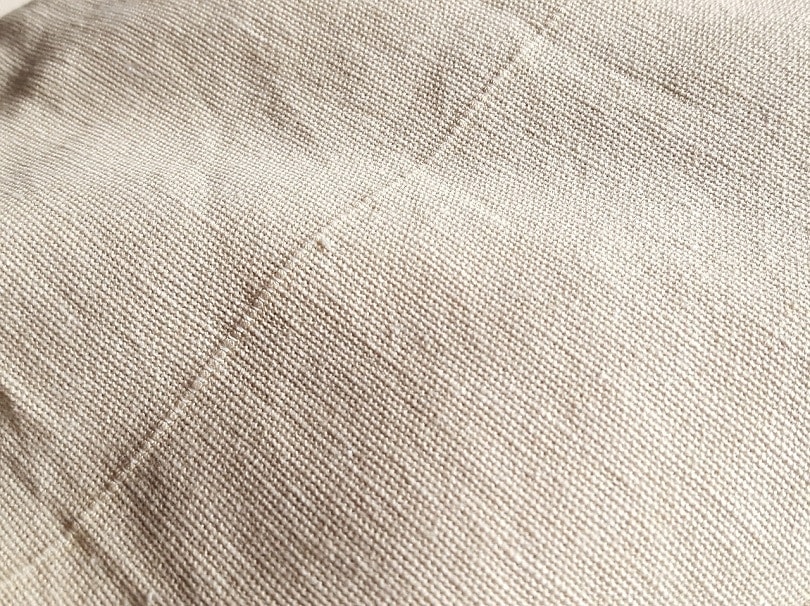
Canvas isn’t just for painting or ship sails. It makes excellent furniture fabric. And that’s because canvas is another extremely durable, yet comfy option. It’s quite similar to denim in that it’s a very durable choice that’s tightly woven together. It also has a very natural feel to it, so there’ll be a pleasant roughness to it.
Canvas furniture can be difficult to find as manufacturers prefer to work in other fabric choices. However, you can have one custom-built for a premium. For a natural feeling fabric, it doesn’t get much better. It’s got the feel of linen without the wrinkling, the toughness of denim without the limited color palette, and the ease of cleaning that leather offers.
Pros
- Tough and sturdy
- Tightly woven
- Natural feel
- Easy to clean
5. Tight Weave Twill
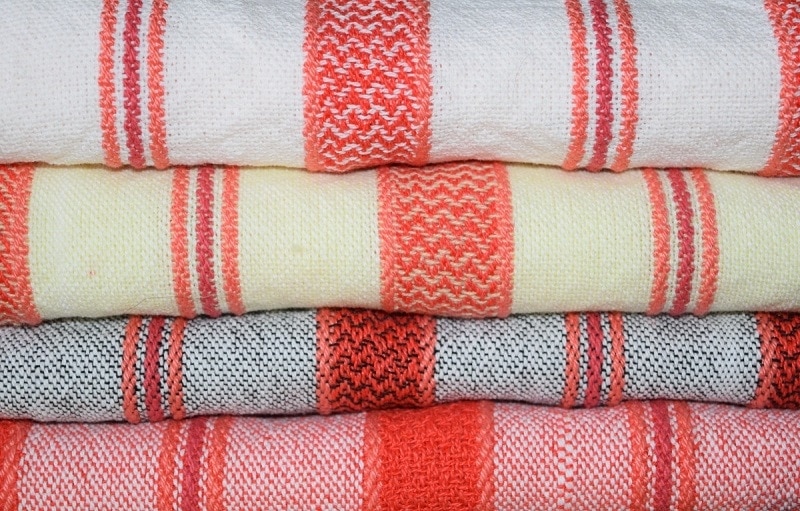
Twill isn’t exactly a fabric, but more of a style of weave. Normally consisting of a cotton or polyester-cotton blend, twill can come in many different thread counts. And it’s one of the most popular furniture coverings around. Finding a twill couch or sofa won’t be difficult at all.
However, it might take a bit of shopping around to find the right thread count and weave. Twill comes in many different patterns and styles—both textured and printed. The trick here is to look for a textured pattern. Textured twill patterns are often woven much more tightly than standard printed, and, therefore, will hold up better to the rough demands placed on them by your dog’s nails.
Herringbone, houndstooth (go figure), and serge weaves are just a few of the better twill patterns to choose from when selecting pet-friendly furniture.
Pros
- Super easy to find
- Tons of different designs
Cons
- Harder to clean
- Will still tear faster than other materials like leather or canvas
6. Microfiber
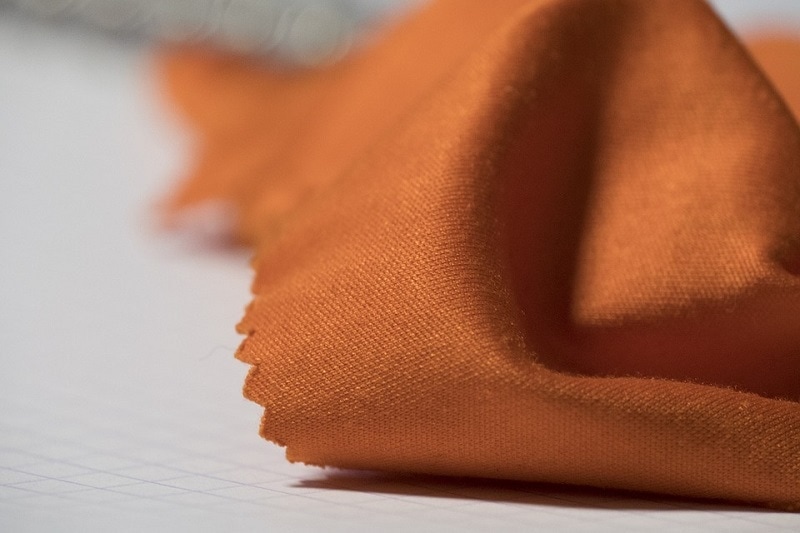
If you love the look of leather but aren’t too keen on its price tag, you might want to look into microfiber. It’s specifically designed to mimic the look of leather (or suede) but has added benefits.
Microfiber couches are often stain-resistant unlike some leathers and can be even easier to clean! They are easily wiped down like leather; however, they often have removable seat and cushion covers that are machine washable. They’re also much softer than leather if you’re looking for a more inviting couch.
This is an excellent choice for any dog parent looking for new furniture and comes at much less of a burden on your wallet. The one thing about microfiber couches, though, is that they’re just not as durable as the real deal. There’s a good chance they’ll need replacing long before your genuine leather furniture does.
Pros
- Very common
- Inexpensive
- Easily cleaned
Cons
- Not as durable as other fabrics
- Can still be ripped or torn
7. Protected Fabrics—Crypton, Scotchgard
If you’re not too worried about rips and tears but pet stains, you’ve got a couple of other options in protected fabrics. These are either materials specifically designed to minimize stains and odors, or protective sprays layered onto your existing couch as a barrier.
For example, many hotels and cruise ships use furniture made with Crypton. Crypton fabric is a patented technology that renders a piece of furniture stain-proof and prohibits the growth of unwanted bacteria.
But if you’re not wanting to go out and purchase Crypton fabric, there’s another simple solution. Pick up a can or two of Scotchgard, or any other upholstery protector. This stuff is great for preventing stains, repelling liquids, and blocking unwanted pet odors. Using Scotchgard is a temporary solution; however, it is much cheaper than purchasing new furniture.
Pros
- Very cheap alternative
- Prohibits the growth of bacteria
Cons
- Normally not too many attractive stylings
- Using a protective spray will require constant reapplication over time
BONUS: Slipcovers
Another super cheap, but effective way to protect your furniture from your dogs is by using slipcovers. Slipcovers are similar to fitted sheets on your bed, but they’re for your sofas and chairs.
They’re often extremely inexpensive and perfect for anyone on a tight budget. Slipcovers can also come in a wide array of patterns and colors making them perfect for almost every room in your house. Plus, they’re machine washable so they’re very easy to clean.
How Dogs Destroy Furniture
Dogs don’t just destroy furniture for malicious reasons. It’s not like they don’t like the color or décor and decide the house needs a remodel. Most furniture destruction caused by dogs is the result of an accident.
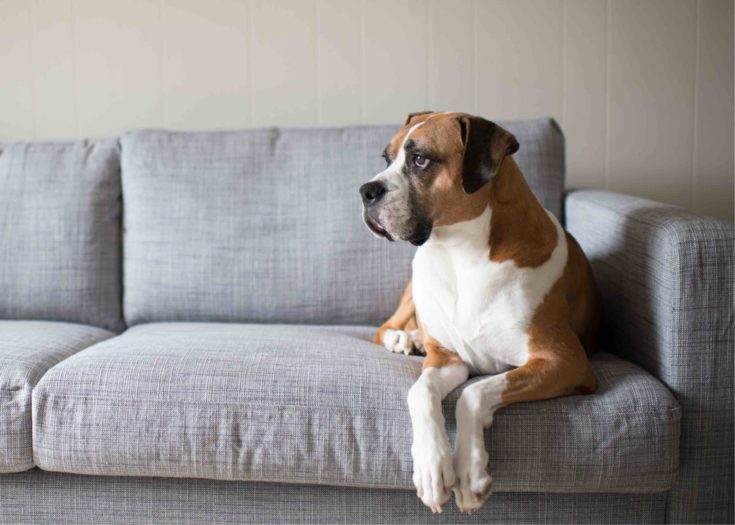
Claw Marks
Your furniture may receive scratches or tears from their nails as they jump on or off. Fortunately, this is the easiest cause to prevent. All you need to do is keep up with your dog’s grooming and keep their claws trimmed. This will prevent them from snagging. Another way is to invest in a couch made of tightly woven fabric.
Relieving Themselves
A dog’s nails aren’t the only force to be reckoned with though. Your pup may accidentally relieve themselves on the couch. Maybe a younger, excitable pup just loses control of their bladder. Or your older dog is beginning to have incontinence issues. Either way, it’s going to need to be cleaned up. Some furniture types make this super easy. A quick wipe down with a damp cloth should take care of things.
Anxious Energy
The biggest nightmare when it comes to your dog destroying furniture is having them completely rip apart your couch or sofa. This is usually done while you’re away and your dog is suffering from separation anxiety. To prevent this, you should begin practicing proper egress and ingress when leaving the house at an early age.

What Fabrics to Avoid With Dogs
Not every fabric out there is a great choice for dog owners. Some materials are very easily ruined and need to be avoided if possible.
Tweed
Tweed may provide a nice rustic look to your home, but it’s far from ideal for pets because it’s rather loosely woven together. This makes it much easier for your pup’s nails to snag and begin unraveling your couch. Plus, the loose weave helps to trap in hair and dust, which can make your furniture smell pretty stinky.
Suede
Suede is like leather’s softer, gentler cousin, but it has no place around dogs. Although it’s pretty durable, it attracts and locks in water spots. Whether it’s drool, pee, or mud, any wet spots are going to become highly visible and extremely difficult to clean.
Silk
Silk is one of the finest materials you can craft furniture out of. And unfortunately, it’s very high maintenance even for those without pets. Add a dog into the mix, and it’s nearly impossible to keep pristine. Silk is a very thin and loosely woven fabric that will tear very easily. It also stains easily and requires a professional cleaner. It’s just best to skip the silk altogether if you’re a pup parent.
Velvet
Velvet is another very high-maintenance furniture material. While it isn’t as thin or loosely woven as silk, velvet comes with its own troubles. It’s an absolute magnet for dog hair. Even if you have a very low shedding dog breed, you’ll still find enough hair on your velvet sofa to build another dog. And it’s also very absorbent when it comes to ripe, unwanted smells. Couple that with the need for a professional cleaner, and you’ll see most dog owners avoiding velvet furniture.

Final Thoughts
Owning a dog doesn’t automatically spell out destruction for your furniture. However, that doesn’t mean it can’t happen. By choosing the right furniture or protective measure against pet stains and damages, your dog and furniture can live peacefully together.
Just remember: tightly, woven fabrics and leather are your friends. And if you’re feeling adventurous, try bringing that patio furniture inside.
Featured Image Credit: Pxhere
Tags
What do you think?
Related Articles

New Puppy Checklist: Gear You’ll Need for Your New Dog
Getting a new puppy is really exciting, but before you welcome them home, it’s important to prepare your space for them. Since puppies need a

How Big Do Mini Poodles Get? Vet Reviewed Average Weight & Growth Chart – Dogster
The information is current and up-to-date in accordance with the latest veterinarian research. Learn more » When you buy a Miniature Poodle, you might not

Can Police Dogs Smell Nicotine? Vet Verified Facts & Info – Dogster
The information is current and up-to-date in accordance with the latest veterinarian research. Learn more » While cigarette sales have been declining steadily for decades,

How Old Is 5 in Dog Years? Vet-Approved Guide to Each Size of Dog – Dogster
The information is current and up-to-date in accordance with the latest veterinarian research. Learn more » A common method for calculating a dog’s age is



